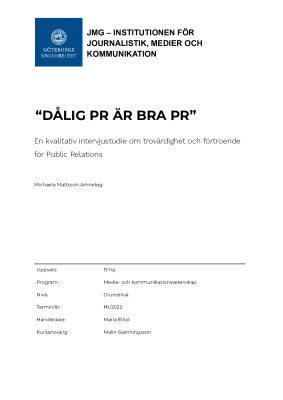“DÅLIG PR ÄR BRA PR”
En kvalitativ intervjustudie om trovärdighet och förtroende för Public Relations
PR, short for public relations, has become a word associated with manipulation, propaganda and often characterized by low trust and low credibility according to research. Associating PR with lies or tricks is perceived to be a pattern, simultaneously PR practitioners are
portrayed in popular culture as glamorous and social individuals. PR seems to be desirable but at the same time obnoxious. Social media and influencers contribute to a new media environment, although there is a lack of new research on credibility and trust towards PR in
this new environment. Previous research has focused on quantitative studies, these often carried out in an Anglo-Saxon perspective. In other words, there are no recent studies, nor Swedish and qualitative studies on this subject. This article intends to fill this gap in research
and aims to study how people reason about trust and the credibility of PR consultants and their messages, as well as possible factors according to individuals that contribute to these assessments.
Following study is completed with seven qualitative interviews and theories about trust and credibility. Furthermore the study aims to answer four main questions about how people reason about credibility and trust in relation to PR consultants and messages, and factors they
believe has contributed to their perceptions. Additionally, these questions concentrate on aspects individuals perceive as important for credibility and whether PR meets these aspects. They also focus on how credible PR is perceived, what previous experiences individuals have with PR, what individuals find important to feel trust, and if PR meets these aspects of trust. Social and heuristics also come to be of importance in strategies of credibility evaluation.
The results show that PR is a concept that the respondents do not fully understand, yet there is an idea of what they do. PR is often associated with marketing, advertising and relations according to the respondents. An aspect which causes a two-sided relationship towards PR, PR is generally perceived as credible and trustworthy, although, in aspects regarding advertising and partiality, trust and credibility seems to take damage. Moreover previous experiences and individuals’ opinions influence how they perceive PR, some for instance perceive PR as better than advertising. Even though PR is associated as such, it is still
comprehended as generally trustworthy and credible. This seems to be a result of vital aspects of trust and credibility according to individuals, which PR mostly succeeds to achieve.
Individuals mention aspects such as truth, honesty, protecting the consumer, integrity, knowledge and experience as important, and fulfilled by PR. In the respondents’ credibility assessments, they proceed from the strategies reputation heuristics, consistency heuristics, interpersonal recommendations and persuasive intent. Which can be thought to be one of the reasons why PR in the selling and advertising aspect is judged to be less credible in some cases, but more credible in other cases where the individual has heard of PR in positive terms. However, important aspects for credibility are not always met. Aspects like partiality, transparency and objectivity may be lacking in PR since PR works with advertising and wants to benefit companies for example. With this, a double standard is portrayed among the respondents.
Similar aspects are highlighted as important for gaining trust. It is evident that a source requires to be credible during a longer period of time to achieve trust, something that PR according to this study manages to do. Generally respondents claim to trust PR, but as with
credibility some aspects may not be fully achieved in which trust can be broken. Although, results indicate that attitudes and cognitive patterns of individuals have an impact on perceived trust and credibility. So to say, it is not always the fault of PR when it sometimes is viewed negatively. PR is expected to work with advertising and to some extent biased. Therefore, it is not a surprise when PR does these things. The expectations do not get broken, instead these aspects seem to be accepted by individuals. And if they sometimes do not find an ad, or campaign trustworthy or credible, they have the opportunity to ignore it. Therefore, the general trust and credibility of PR remains steady.
Keywords: PR, public relations, trust, credibilit

